At 62, Jon Bon Jovi Is More Bon Jovi Than Ever
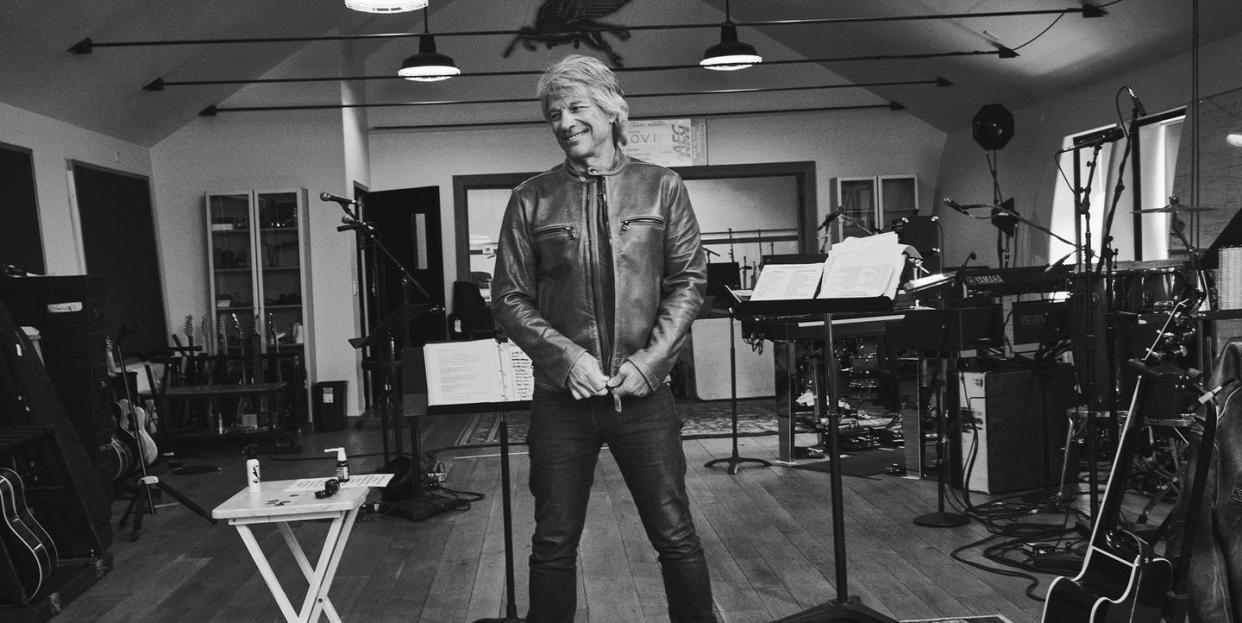
JON BON JOVI is not happy with me. 'You’re missing marks all over the place,' he says in his living room. He's responding to my paraphrasing a quote about the vapidness of the Hollywood lifestyle from one of his old interviews and what turned out to be an incorrect assertion I mentioned about a separate historic building that used to be on the property. His assistant told me the foundation of that structure had to be removed, and Bon Jovi infers I’m insinuating that there was once something wrong with his French neoclassical mansion, built from scratch down the Jersey shore in the late '90s. He will later point out a framed photo illustration of a home growing out of a very sturdy tree trunk – the art for the 2016 album This House Is Not for Sale—seemingly to underline the metaphor: We’re on stable ground here, thank you very much.
Very stable: Bon Jovi – the group, though also the Jon – has grossed more than $1.3 billion in tour revenue and sold more than 120 million copies of 15 albums (soon to be 16, with June’s forthcoming Forever). The hard-pop-rock group has been inducted into the Rock & Roll Hall of Fame with a Grammy-winning oeuvre whose subject matter spans the goings-on at strip clubs and the practical repercussions of labor disputes. As an individual, Bon Jovi released two albums and had a brief but hunky acting career in the late ’90s and early ’00s that he says was, like Madonna’s and David Bowie’s, hamstrung by his unwillingness to give up music.
Bon Jovi has been honoured by the Songwriters Hall of Fame and the Garden State Parkway, where the Jon Bon Jovi Service Area (exit 124) features a Sbarro and a hologram of JBJ talking about pork roll. His band’s formation, ascent, and dominance are documented – alongside his 2022 tour-halting vocal-cord issues – in the four-part Hulu documentary Thank You, Goodnight: The Bon Jovi Story, premiering April 26. Series director Gotham Chopra sums up the sexy workingman appeal by quoting his cousins in India: “Bon Jovi had this crazy hair, fast cars, and ‘Livin’ on a Prayer’ … Bon Jovi was America.”
Bon Jovi is speaking to me in late March to promote the docuseries but seems to be having second thoughts. 'I’m scared of this interview,' he says. He squints in what appears to be annoyance under bangs that have remained resplendent over his 41 years as the frontman of his eponymous band. Bon Jovi is sitting catty-corner to the deep sofa I’m on, a vast proxemic space for an intimate conversation between two people in one of their homes. He seems both relaxed in his dominant position – his wide-legged, foot-planted posture in a cream armchair conjures the Lincoln Memorial, if the president were wearing jeans and a T-shirt – and emotionally coiled. When we’re on a topic the 62-year-old is comfortable with, like his charitable work or family, Bon Jovi opens the large hair clip he’s holding and slowly releases it, sometimes attaching the claw to his formidable triceps. When we get to subjects he likes less, such as questions that don’t jibe with his own self-analysis, he lets the clip snap shut in his hand.
He says in the doc and echoes to me, 'By 40 you start to measure, Did you accomplish what you set out to do? By 50 you start to think about a legacy. By 60, I think as the Chinese proverb says, it’s basically, You are the man you were meant to be.' The statement implies acceptance – especially when he tells me, 'Now whether it’s a good man, a bad man, a spiritual man, not a spiritual man, a fulfilled man, whatever'—but any aberrance in my interpretation from his own is met with irritation.
The mark is missed again when Bon Jovi talks about his love of American history and “obsession” with Benjamin Franklin, whom he calls “the brains behind the brains.” Is that how Bon Jovi thinks about behind-the-scenes people like the band’s longtime producer Obie O’Brien and Desmond Child, cowriter of many of the band’s biggest songs? 'Why would you say that?' Bon Jovi says, staring at me. Snap.
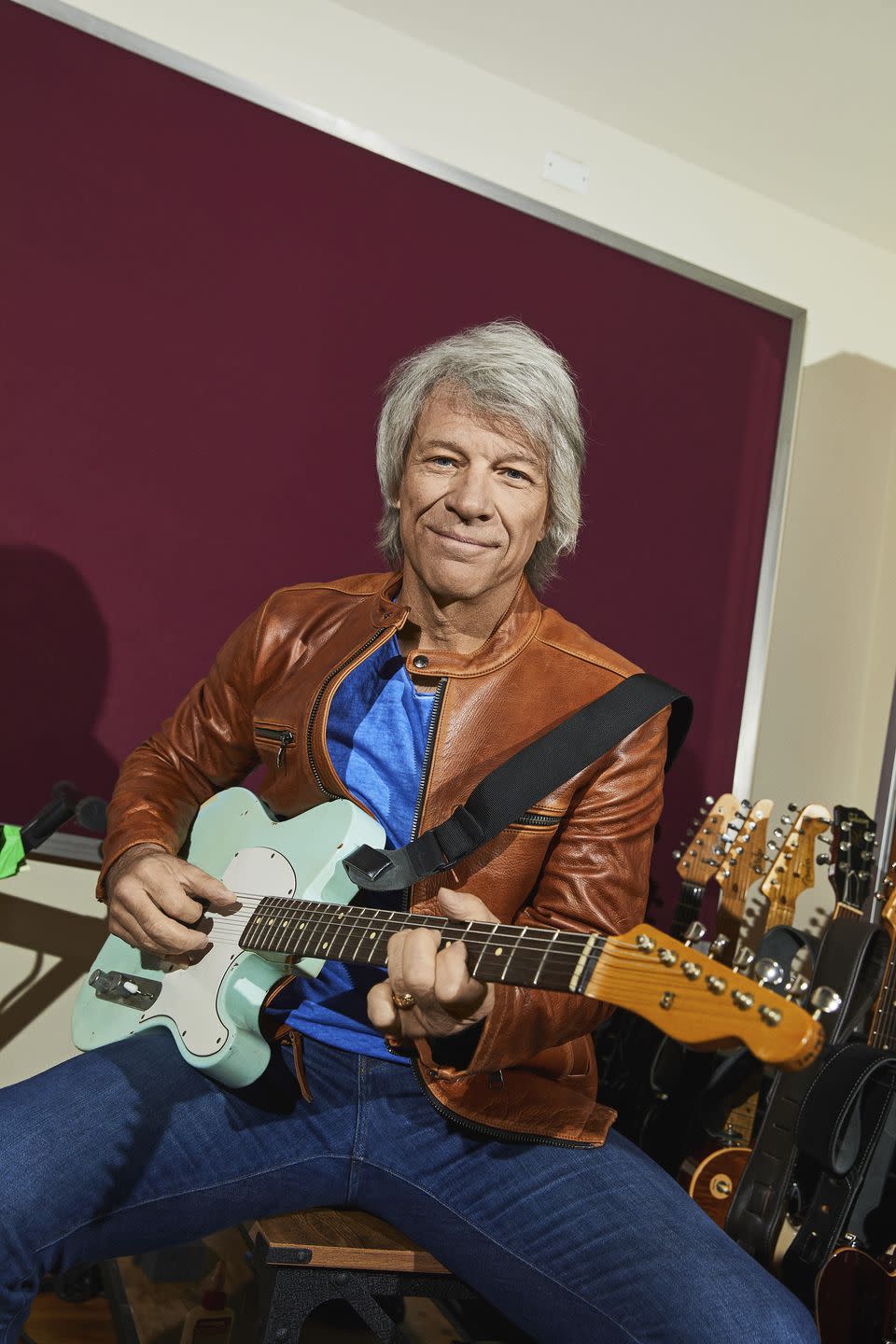
He has a different analogy: 'Henry Ford didn’t build the car. He came up with the idea.' As for the non-eponymous members of Bon Jovi, 'Everyone was a great contributor along the way, for sure.' In other words, at the Bon Jovi factory, Jon is Henry Ford; the others are on the assembly line. His collaborators agree. Child – who named Bon Jovi godparent to his kids and is appropriately proud of cowriting “Livin’ on a Prayer,” which he calls “the national anthem of New Jersey”— says, 'the graciousness of Jon Bon Jovi is allowing us to be part of the circle.' Chopra says Bon Jovi keyboardist David Bryan told him, 'Jon’s like the captain of the ship, and I’m in cabin 37C. I go where he goes.'
This is a man who was described to me via email as a “perfectionist” by his friend Tom Brady, which is a little like Elon Musk calling someone “very online.” Bon Jovi uses Brady’s TB12 workout method, and his trainer Felicia told me she was dispatched to exercise, massage, and acupuncture Bon Jovi around the world after he tried to hire Brady’s own personal trainer and was told that guy already had a job. These days, he trains with Felicia first thing in the morning, five to six times a week. He used to do a lot of heavy weight lifting (a high-impact workout) and running (hard on the knees). But after a career’s worth of occupational injuries (shoulder, calf, plantar fasciitis, meniscus tears), he now prizes pliability, abetted by stretching and resistance bands. It keeps him performing to his exacting professional standards, while maintaining a daily tennis habit. 'If I could be on the seniors handicap division of professional tennis,' he says, 'that's my aspiration.'
To have a five-decade run leading one of the most successful bands in the world doesn’t happen by accident; Bon Jovi has described himself as a “benevolent dictator.” 'Jon always wants to give everyone the best experience,' Brady says. 'He has always been into taking care of himself, because he’s a performer and he never wants to let anyone down.' If his prickliness seems to be at odds with making people feel good, it might just be Bon Jovi’s brusque way of indicating that someone isn’t meeting the standards he holds himself to. A perfect outcome doesn’t have to come from a perfect process, as he tells me during our less-than-seamless conversation.
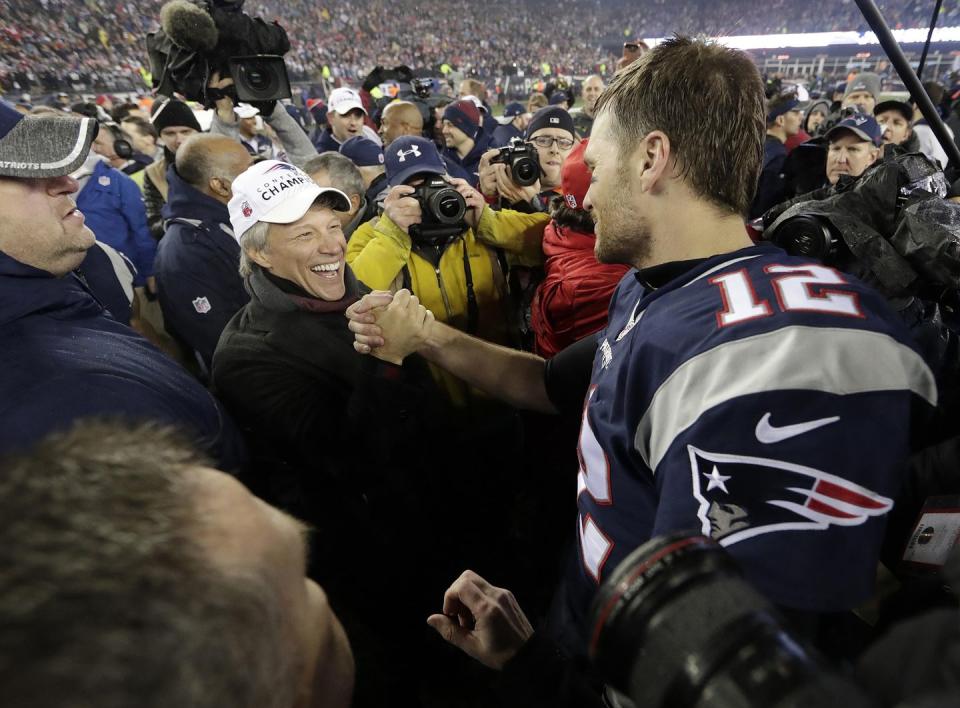
But at this point in Bon Jovi’s life, “push[ing] himself to the limits,” as Brady says, and asserting control – of himself, of the way people perceive him – cannot change the inevitable entropy of the human body or the added strain from this many years of being a musical icon, the way he’s done it. It can’t make new his vocal cord, as small as a thumbnail, which Bon Jovi says “runs the economy.”
There is a scene in the docuseries in which Bon Jovi expresses awe that he 'used to run around these things – stages – like a motherfucker. Showboating fucker,' he says. 'One of the best there ever was. Now the champ is tired.' When it’s suggested that means he fatigues more easily than he did decades ago, Bon Jovi curtly says, 'No. I had a lot of energy. I was 25 and 30 years old. I wouldn’t want to run around the stage in that manner now.' That sounds like making a virtue of necessity, but in person his body – more than twice the age of that kid’s but still lithe from the Brady regimen – reveals no visible physical limitations, even in the gym.
To illustrate his point, Bon Jovi begins the setup of a joke about a young bull and an older bull deciding how fast to go down a hill. (He judiciously decides not to tell it, but basically the younger bull suggests they run down and mate with a cow. The older one says instead they should walk and have sex with all the cows.) Bon Jovi says of the bull analogy, 'The idea is that with age comes experience and with experience comes the opportunity to just do things differently. Still the same outcome but just differently.' He says he went to Tony Bennett’s last show, less than a year before the singer died of Alzheimer’s at 96. He 'still hit the high notes,' Bon Jovi says. The possibility of being that kind of exception seems tantalising, even with the daunting reality that Bon Jovi is 33 years away from that age and trying to rebuild to touring based on the body and voice he has, not the body and voice he used to have.
The docuseries is a mirror of how we all deal with becoming our older, actual selves when it also matters what our past iterations mean about us. Whatever Bon Jovi’s buddy Bruce Springsteen says, it’s actually fine to hold on to glory days, even if we don’t want to think of it that way. It’s also not surprising someone whose days were as glorious as Bon Jovi’s still seeks transcendence from earthly life, even if the music that created his success revels in it. The chorus of the band’s new song “Legendary” insists, 'Got what I want ’cause I got what I need, got a fistful of friends that’ll stand up for me, right where I am is where I wanna be.'
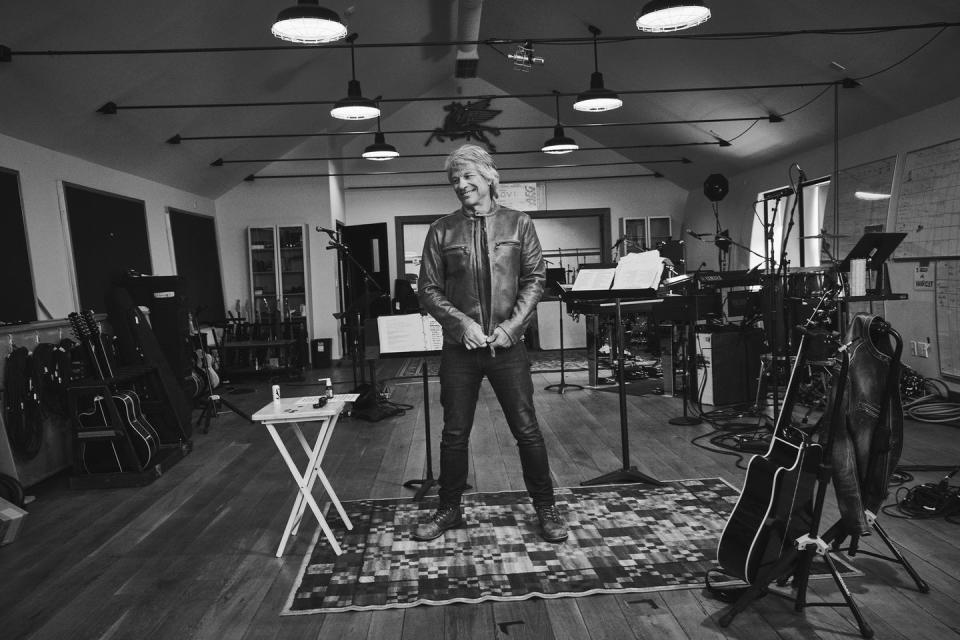
There’s an old interview in which a young Bon Jovi discusses the “danger” of becoming a heritage act like the E Street Band or the Rolling Stones, and he clarifies to me what happens when your peak – by the standards of actuarial tables and the Billboard Hot 100 list – is decades behind you. 'You can’t eventually compete with this year’s model of the top pop act,' he says. 'But as a legacy band like the Rolling Stones and the E Street Band, you’re going to sell out every night, and you’re going to play to a certain crowd with the hopes that you’re going to attract a younger crowd based on people telling people.… I’m not chasing pop radio. I can’t! I’m too old.'
When I try to pin Bon Jovi down on the kind of man he is, now that he is who he’s meant to be, according to his proverb, he says he’s “a work in progress.” While this could be a time to enjoy what he’s built—and he does say with evident sincerity that he knows he is “incredibly blessed, beyond comprehension” – Bon Jovi is clearly still chasing something. Though we go many conversational rounds where he pushes back on the idea of desiring validation or specific markers of relevance, he still burns to create things that make them come. 'By happenstance,' he tells me, as if writing a successful song was an accident and not a goal, “Legendary”—that ode to appreciating the mundanity of ordinary life – 'is fucking exploding. We’re on Hot AC Radio. I mean, that’s where they play J-Lo and Ice Spice for goodness’ sake. And it’s exploding. So go figure. But hooray for us. We did it again.'

THANK YOU, GOODNIGHT, is a new approach to attempting Bon Jovian perfection again. For the project, he personally approached Chopra, who cofounded the production company Religion of Sports with Brady and Michael Strahan. Bon Jovi says of the Emmy-winning filmmaker, 'I felt his relation to sport [and] his relation to spirituality were two things that I could connect with, based on what his father does.' (Chopra’s father is Deepak, the alternative-medicine advocate.) Chopra says he explained soon after he and Bon Jovi met in February 2022, 'Hey, someday Men’s Health is going to do an article on this. If you’re a producer, man, and if your hands are all over this, it’s going to be a vanity piece. That’s what it’s going to be, whether it is or not … that’s just how these things get framed.' So Bon Jovi forewent final cut and is not a credited producer. 'He’s very smart,' Chopra says of Bon Jovi and his understanding of why it benefitted him to not overtly interfere with the filmmaking process. 'There’s a reason he’s not only been a prolific artist but a prolific businessperson.'
Bon Jovi says he gave Chopra access to his life and the people in (and formerly in) it with independence because 'there was no need for a puff piece at this point in my life.' It’s also probably safe to assume that because Thank You was produced by his friend Brady’s Religion of Sports, there wasn’t much risk it would be unflattering to him.
There are dissenting opinions represented in the series. Along with Bon Jovi’s former manager Doc McGhee – who acts exactly like you’d think a man named Doc who managed Bon Jovi and Mötley Crüe in the 1980s would, complete with drug smuggling – the documentary features ex-guitarist Richie Sambora, whom Bon Jovi describes in the docuseries as his “perfect foil” and was probably as close to a counterpart as it’s possible for a non–Bon Jovi member of Bon Jovi to get. In archival footage, Sambora describes the challenge of serving at the pleasure of Jon Bon Jovi. 'See, in Bon Jovi, even when I write with Jon, I write for Jon to be able to sing what he needs to be able to sing,' he says. Sambora also shares the story of being fired from the group. (Recollections vary: Bon Jovi and other members of the band point to Sambora’s substance abuse and the fact that he didn’t show up for songwriting sessions or a show, while Sambora says, 'Jon got in a strange mood about time' and pins his own absence on caring for his daughter during ex-wife Heather Locklear’s mental-health issues.)
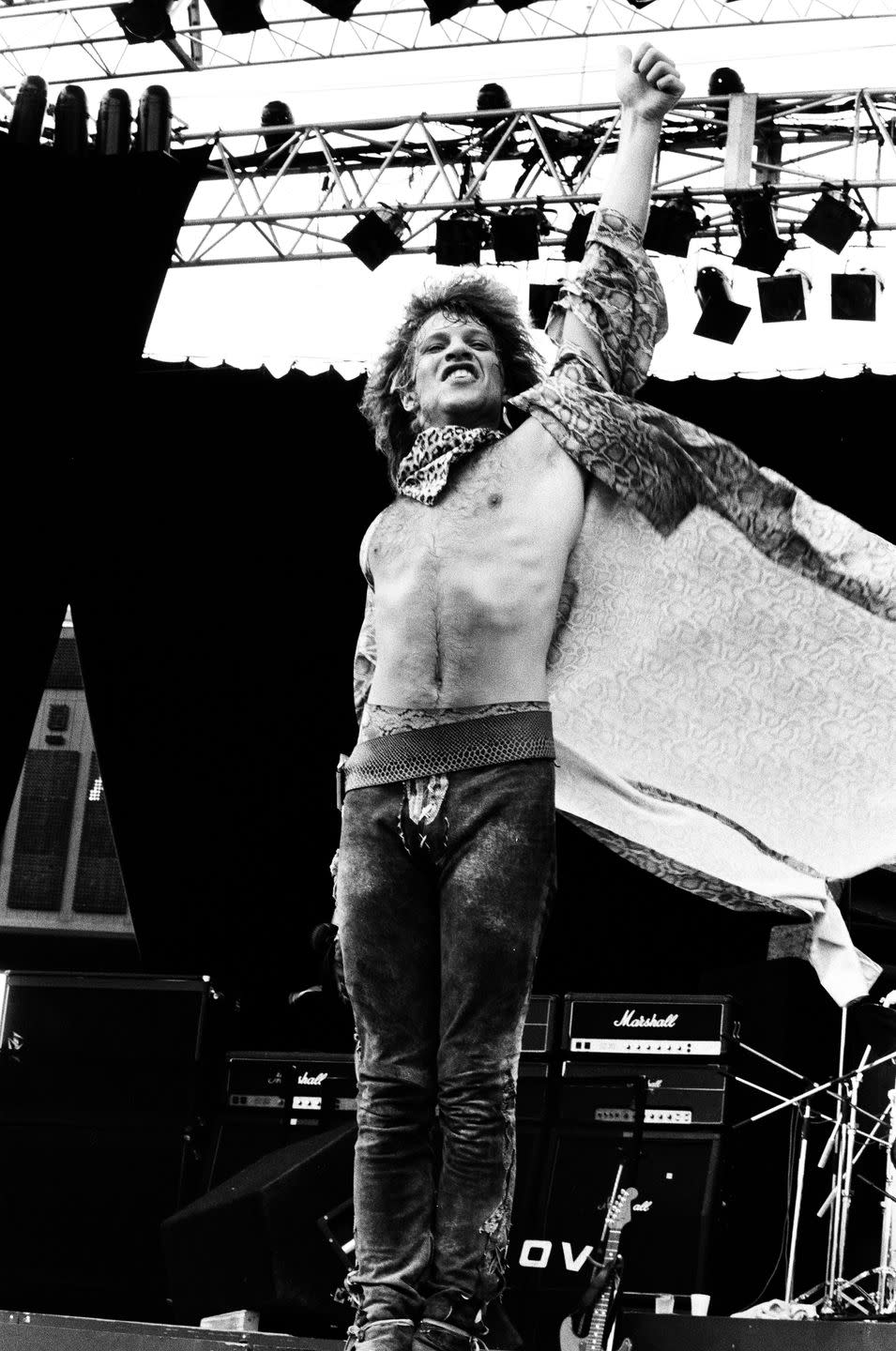
The historic retelling of the band is juxtaposed with the 2022 tour they were about to embark on. When Chopra suggested that structure, he says he wasn’t aware of the extent of Bon Jovi’s vocal issues. Bon Jovi admits, 'There was once or twice where I said, "Get out of the room"' when he was struggling. Chopra says the singer reminds him of the punctilious Kobe Bryant, who was also the subject of a Chopra documentary. 'I knew early on he can be combative,' Chopra says of Bon Jovi, 'so you have to engage him in other ways. Like, not get into fights with him, because if you do, he’s not gonna want to lose.' Though the documentary vividly captures Bon Jovi’s drive and meticulousness, his pugnaciousness isn’t a presence.
During the monthlong tour, Bon Jovi’s vocal quality suffered to the point where his wife, Dorothea, intervened. The couple have known each other since high school and will have been married, as of April 29, for 35 years. Their relationship endured the kind of touring mishegoss that inspired the album title Slippery When Wet; in the docuseries, Sambora says, 'we looked better than half the girls we ended up with' on the first tour, which Bon Jovi calls “the American wet dream.”
When Dorothea is the topic of conversation – her love of RuPaul’s Drag Race, her fourth-degree black belt in karate – Bon Jovi visibly relaxes. Whereas other smiles flashed during the conversation feel like warning signs, the Dorothea grins are warm. We’re not fighting anymore; we are in agreement that she is very, very cool. Chopra says that Dorothea served as an unofficial fact-checker during production, anchoring her husband’s memories to context. As one of the few participants outside of Bon Jovi’s professional world and band hierarchy, her onscreen presence is similarly grounding. You see Bon Jovi when he’s in his 20s and the most beautiful person alive, with all the hair and all the women and all the crazy stories … then there’s Dorothea, who feels so solid and real. (It should be said that Dorothea was – and, like her husband, remains – a fox.) 'I finally needed a higher high,' Bon Jovi says in the docuseries of why he eloped with Dorothea in Las Vegas in 1989 after six years of touring with the band. There’s footage of them taking a motorcycle trip on which Dorothea says the rule was they could stay only in motels that cost less than $30 a night. It was her idea to start the JBJ Soul Kitchen, a pay-what-you-can restaurant that has four locations in New Jersey. When I meet her, she’s leaning on a doorframe in ankle-high slippers and plotting about how to get a friend and local recipient of a portion of a winning billion-dollar lottery ticket to donate money to the charity.
But the tour was challenging for her husband. Even normally friendly local papers were publishing brutal reviews. 'Sunday’s show delivered pretty much everything you’d want from a Bon Jovi concert with one major exception – some shockingly poor vocals from Jon Bon Jovi,' wrote the St. Paul Pioneer Press of their April 3 show. 'One can’t help but wonder why no one in the Bon Jovi organisation sat the guy down for an honest chat. I guess it’s because he’s the boss and no one wants to cross him?' After a performance in Nashville a few weeks later – sponsored by Hampton Water, Bon Jovi’s rosé collaboration with one of his four children – Bon Jovi came backstage and assessed the show for Dorothea. 'That was pretty good,' he said, scoring it in the “high 80s.” He says she responded, 'No.'
Chopra says, 'Dorothea is probably the one person who both has the perspective but also just the balls to say that to him.' ('I don’t need my wife to tell me how great I am,' Bon Jovi says pointedly, after I mention it would be difficult for me to hear from my spouse that I wasn’t doing a good job.)
'It sucked,' he says. It sucked to stop the tour. It sucked that his wife had to disabuse him of the idea that he was performing well. It sucked to have a vocal cord atrophy to the point where he underwent surgery. It sucked that Bon Jovi’s incredible work ethic – being a “good boy,” as he puts it – could not be guaranteed to fix the issue to the point where he’s sure he’ll be able to go out again two and a half hours a night, four nights a week. 'This experience has sucked,' Bon Jovi reiterates. 'This album' – the forthcoming Forever, from which Bon Jovi turned suck into music – 'is great.' Obviously, it would really suck if he’s not able to tour it; that will only happen when and if his voice supports it, which it currently doesn’t.
'The Lord giveth and the Lord taketh,' Bon Jovi says of accepting that this is ultimately out of his hands. He describes himself as a recovering Catholic, citing the 'pretty rotten guilt laid into the Catholic religion in an organised way.' Bon Jovi has his own communion, which sounds a lot less accepting of the fact that what happens with his vocal cords is in God’s hands. 'I sang "Prayer" yesterday at [vocal] therapy,' he says, explaining he wants to "clear up a misconception with this storyline out there now." Perfectly. I can hit the high B’s and C’s, no problem.' His speaking voice today certainly sounds much stronger than it was in the documentary.
Bon Jovi maintains that he will not return to touring unless he’s "100 percent of 100 percent." 'We’re so blessed at this point that we can go out,' he says. 'I’m amazed, because I’ve heard [everyone from] doctors to people in the industry say to me, "People will pay money just to see you go up there and do it." I don’t want their money, and I’m not going to spend their time. It’s just not an option.' (For what it’s worth, Chopra asked Springsteen, who appears in the docuseries, if he performs as well in his 70s as he did as a younger man. He says Springsteen said, “No, but you know what I am? I’m a fucking rock star.”)
Bon Jovi says he watched a rough cut of Thank You, Goodnight a few months ago. 'There were laughs and tears to see it all there in front of you,' he says. 'To know you’re at your own bar mitzvah or wake, depending on how you look at it.'
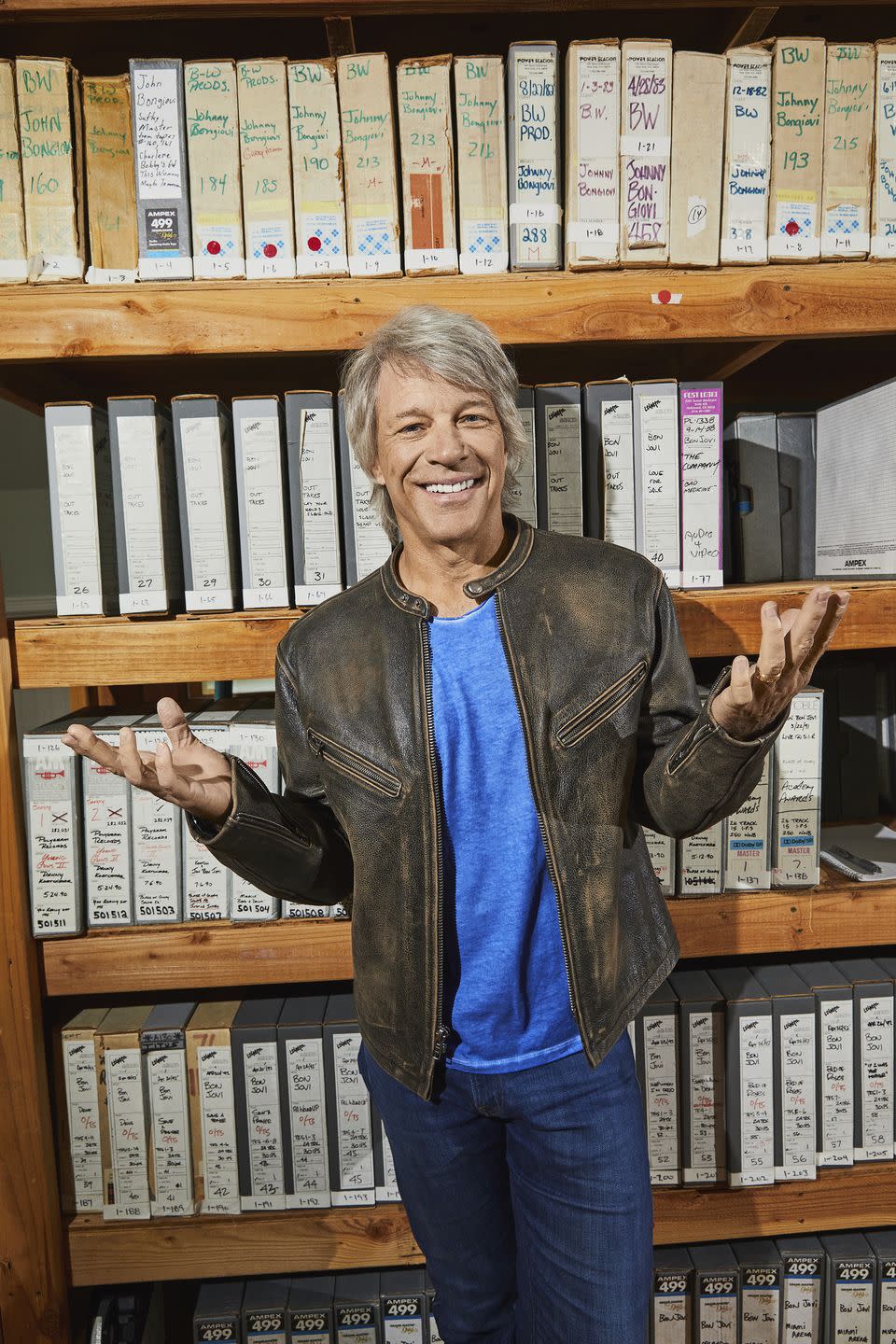
When asked who he is when he can’t do what he does – be a current touring icon – Bon Jovi tells me, 'This is what I do. It’s not who I am.' He adds, 'I’m not defined by the guy beside the microphone. There’s so much more.' He knows we know the ground-out accomplishments that preceded this moment of Zen. His voice isn’t slow and irritated sounding, like it was when I was missing all those marks. Bon Jovi sounds as grateful and secure as he says he is. 'You don’t forget about the other 40 years of being Tom Brady now that he’s not throwing a football any longer,' he says of his peer in perfection. However: 'He’s not going to be able to go to the Super Bowl again unless he buys a ticket.'
Bon Jovi says he has a new mantra. '"It’s not ‘Seize the day,"' he says. "It’s ‘Embrace the day." I used to want to punch it in the face, roll out of bed swinging. Now I want to hug it.'
But for all the talk of the mantra, his assertion that he is a river, always flowing and adjusting its course, that a post-touring career will be full enough with grandkids and wine and philanthropy, it’s clear Bon Jovi is not submitting to whatever will be. If anyone actually thinks that, well, to quote Bon Jovi quoting Benjamin Franklin, “Fuck ’em.”
Grooming by Loraine Abeles.

You Might Also Like


